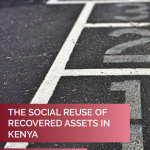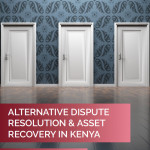Over the past twenty years, Kenya has seen a number of financial crime- and corruption-related scandals involving large sums of money. The recovery of stolen assets plays a vital role in the fight against corruption, ensuring that stolen funds are returned to their rightful owners and reinforcing transparency and accountability within the nation. In Kenya, we are seeing growing amounts of money returned through both asset recovery carried out domestically and from overseas destinations.
To understand Kenya’s progress, as well as challenges in the adoption of asset recovery frameworks and their implementation in practice, Civil Forum for Asset Recovery (CiFAR) has launched two new reports:
- The Social Reuse of Recovered Assets in Kenya
- Alternative Dispute Resolution & Asset Recovery in Kenya
Alternative Dispute Resolution (ADR) as a method used to resolve disputes outside of traditional courtroom litigation has increasingly been used to recover illegally acquired assets. While the use of ADR potentially signifies a departure from court litigation approaches towards more collaborative and time- and resource-efficient methods of resolving disputes, ADR can also become a part of complex resource-intensive judicial proceedings.
The social reuse of recovered assets, when assets are effectively utilized through social projects that address the needs of society, emphasizes the involvement of civil society in decision-making processes and the establishment of clear parameters for asset reuse.
CiFAR’s research shows that while Alternative Dispute Resolution has been used in a number of cases to successfully recover the proceeds of corruption in the country, these domestic recoveries have been socially reused only sometimes. In the case of cross-border recoveries, there have been notable examples of social reuse of assets, such as the purchase of ambulances after the Chickengate scandal return from the UK.
Lewis Kundai, Project Officer at CiFAR said that: “It is important to establish sound policy frameworks to set rules for ADR as well at the social reuse of assets.” He added: “In order to improve the social reuse of assets, challenges regarding project selection, stakeholder inclusion, and the monitoring and audit of funds, including who ultimately benefits from these initiatives needs to be improved.”
Jackson Oldfield, Director at CiFAR stressed that “Key to improving the use of ADR for asset recovery in Kenya is that relevant authorities should continue to regularly assess the legal framework, determine the most suitable ADR method for each case, involve relevant stakeholders, ensure transparency and accountability, and comply with international standards. Monitoring, evaluation, and public awareness are also crucial in assessing the effectiveness and addressing any misconceptions surrounding ADR”.
Download the reports

The Social Reuse of Recovered Assets in Kenya
This report looks at the growing practice of social reuse as a facet of the management and disposition of recovered assets.
It considers how social reuse has been and could be further utilised as a concept in Kenya as a way to build community empowerment while fighting corruption.

Alternative Dispute Resolution & Asset Recovery in Kenya
This report looks at how and when ADR has been used as a tool for asset recovery in Kenya.
As a country at the forefront of using alternative methods to address anti-corruption cases, it considers the opportunities and challenges using ADR in addressing corruption presents, and what lessons can be drawn for other jurisdictions.
